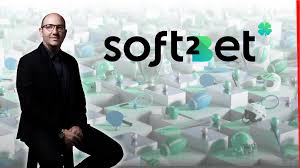
Unlocking Consumer Engagement Through Personalized Marketing Tools
In today’s competitive landscape, brands are consistently seeking ways to stand out and create meaningful connections with their audience. One of the most effective ways to achieve this is through personalized marketing tools. These tools enable businesses to tailor their marketing efforts to meet the unique preferences and behaviors of individual consumers. The integration of personalized marketing strategies has been a game-changer for many companies, allowing them to foster deeper relationships with their customers. As you explore this dynamic approach, consider how personalized marketing tools Soft to Bet utilizes these tools effectively.
Understanding Personalized Marketing
Personalized marketing refers to the practice of using customer data and insights to create customized experiences for consumers. This can encompass a wide array of strategies, including targeted emails, tailored content recommendations, and personalized ads. By analyzing data such as browsing behavior, purchase history, and demographics, companies can gain valuable insights into their consumers’ preferences, allowing them to deliver messages that resonate more effectively.
The roots of personalized marketing can be traced back to traditional marketing, which fundamentally relied on market segmentation. However, advancements in technology and the explosion of data have transformed these methods. Today, businesses can harness artificial intelligence and machine learning to process and analyze vast amounts of data, leading to real-time personalization at scale.
The Importance of Personalization
Why is personalization so critical in marketing today? The answer lies in consumer expectations. As customers are inundated with generic marketing messages, they have come to expect relevant and tailored communication from brands. A study by Epsilon revealed that 80% of consumers are more likely to make a purchase when brands offer personalized experiences.
Furthermore, personalized marketing helps to increase engagement rates. For example, targeted emails have been shown to have a 29% higher open rate than those that are non-personalized. By delivering content that speaks directly to the consumer’s needs and interests, brands can significantly enhance the effectiveness of their marketing campaigns.
Types of Personalized Marketing Tools
There is a broad spectrum of personalized marketing tools available today. Some of the most notable include:
1. Customer Relationship Management (CRM) Systems
CRM systems such as Salesforce and HubSpot allow businesses to keep track of customer interactions, preferences, and history. By centralizing this information, companies can tailor their marketing strategies more effectively and enhance customer experiences.

2. Email Marketing Platforms
Tools like Mailchimp and Constant Contact enable businesses to segment their email lists based on various criteria. This segmentation allows brands to send targeted campaigns that are more likely to resonate with specific groups of customers.
3. Website Personalization Software
Tools such as Optimizely and Dynamic Yield enable businesses to tailor website content based on user behavior. For example, a returning visitor may see different content or offers compared to a first-time visitor. This customization can lead to higher engagement and conversion rates.
4. Social Media Advertising
Platforms like Facebook and Google Ads provide powerful targeting options, allowing businesses to reach specific demographics with personalized ads. By leveraging past user behavior and interests, these platforms can deliver highly relevant advertisements to potential customers.
Implementing Personalized Marketing Strategies
The successful implementation of personalized marketing strategies requires a well-structured approach. Here are some key steps to consider:
1. Gather and Analyze Data
The first step is to collect data about your customers. This data can be obtained from various sources, including website analytics, social media insights, and purchase history. Once collected, this information should be analyzed to identify patterns and preferences among different consumer segments.
2. Segment Your Audience
After analyzing the data, businesses should segment their audience based on shared characteristics or behaviors. This segmentation will allow for more targeted marketing efforts that speak to the specific needs and desires of each group.

3. Develop Tailored Content
Content is key in personalized marketing. Businesses should create messaging and offers that resonate with each audience segment. This may include personalized emails, special discounts, or content that addresses specific pain points.
4. Test and Optimize
Like any marketing strategy, personalization requires constant testing and optimization. Businesses should monitor the performance of their personalized campaigns and make necessary adjustments to improve outcomes. A/B testing can be particularly useful in determining which messages or tactics yield the best results.
Challenges of Personalized Marketing
While personalized marketing offers numerous benefits, it is not without its challenges. Businesses must navigate data privacy concerns, setting and adhering to compliance regulations like GDPR. Additionally, the sheer volume of data can be overwhelming, requiring companies to invest in the right technologies and expertise to manage it effectively.
Another challenge is ensuring consistency across all customer touchpoints. A disjointed experience can lead to confusion and frustration, ultimately harming brand reputation. It’s crucial for businesses to create a cohesive strategy that maintains personalization throughout the customer journey.
The Future of Personalized Marketing
Looking ahead, the landscape of personalized marketing is primed for further transformation. As technology continues to evolve, marketers will gain access to even more sophisticated tools that can enhance their personalization efforts. Advances in artificial intelligence and machine learning will enable brands to create more dynamic and interactive customer experiences.
Moreover, as consumers become increasingly aware of their data privacy, brands that prioritize transparency and ethical transparency will build stronger trust with their audience. The future of personalized marketing lies not only in honing in on consumer preferences but also in fostering genuine relationships built on trust and respect.
Conclusion
Personalized marketing tools have transformed the way businesses engage with their customers. By leveraging data-driven insights, brands can create tailored experiences that resonate with individual consumers, ultimately leading to enhanced engagement and loyalty. As businesses continue to navigate the complexities of the digital landscape, embracing personalized marketing strategies will be crucial in standing out and fostering lasting relationships with consumers.
In the end, personalized marketing isn’t just about selling; it’s about building connections and crafting experiences that leave a lasting impression. As companies continue to innovate and refine their strategies, those that effectively employ personalized marketing tools will undoubtedly stand at the forefront of their industries.

Recent Comments